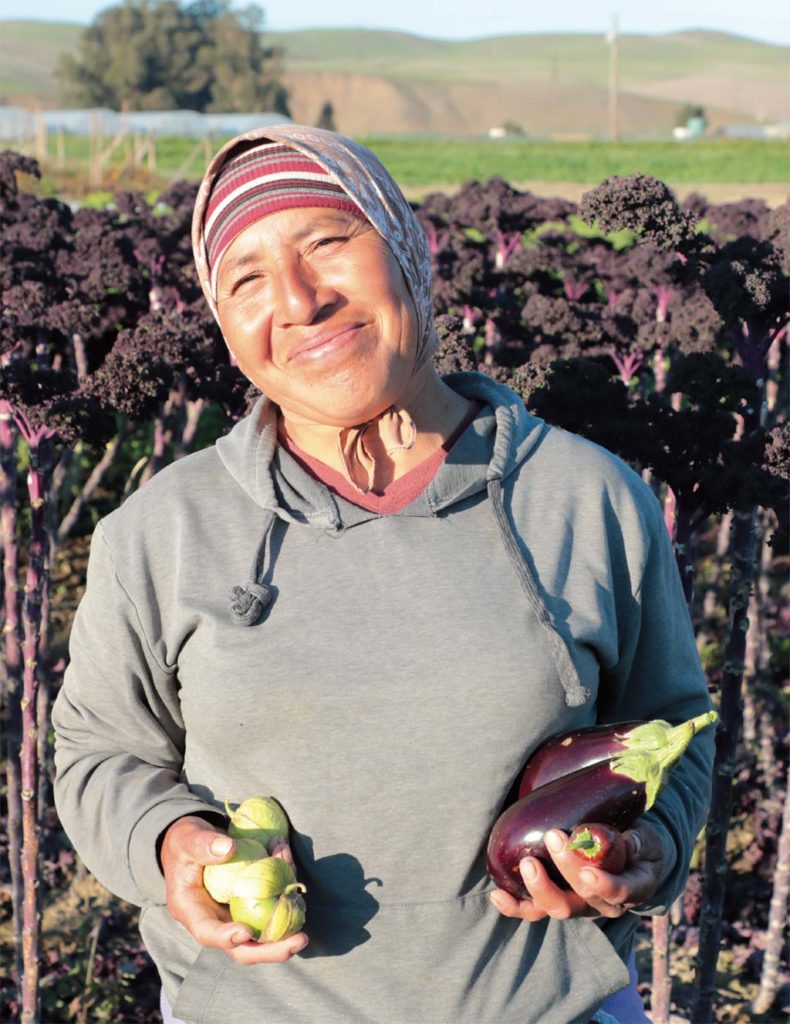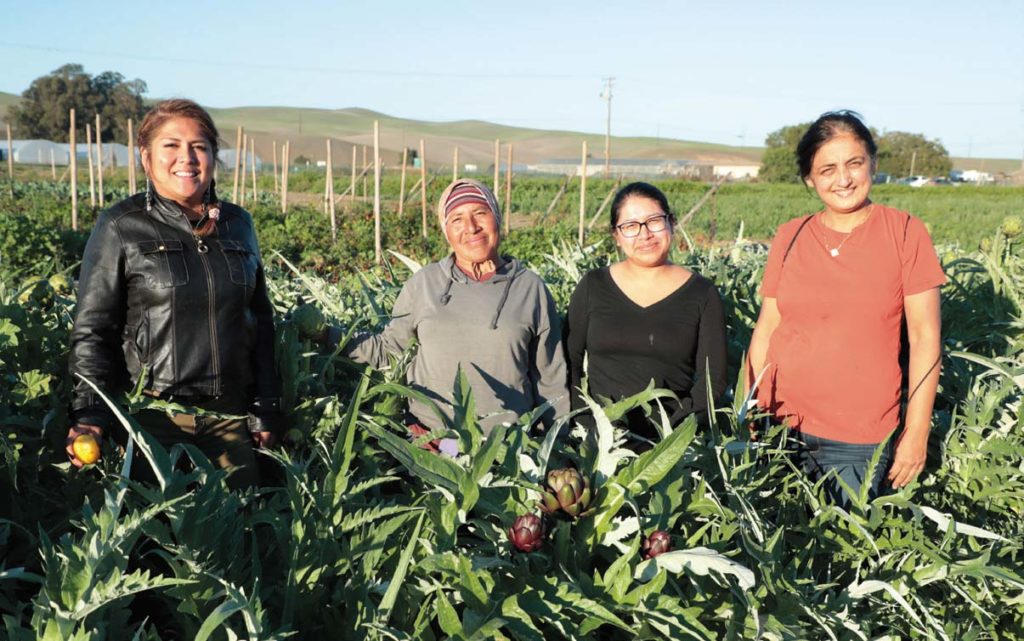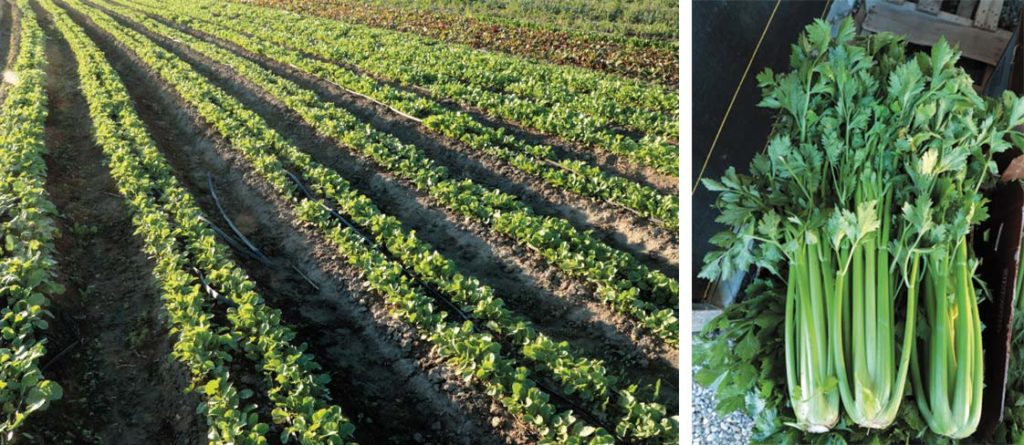PHOTOGRAPHY BY ROBERT ELIASON

Non-profit Tera Farm is helping women-owned small farms survive the pandemic
Maria Ana Reyes began working in the fields when she was eight years old. Now, at 49, she cultivates 11 acres of her own in San Juan Bautista and Watsonville. She calls her farm Narci Organics, after her mother, and is one of the core contributors to Tera Farm—a produce box program with distribution points from Carmel to Menlo Park. Her journey began in 2016 when she was given a half-acre to work, through the Organic Farm Incubator program offered by the Agriculture and Land-Based Training Association (ALBA) in Salinas.
“I learned to manage a farm in the incubator program,” she says. “We can only be farming there for four years, but I learned how to grow different crops so I can have the foods customers are asking for.”
Founded in 2001, ALBA has graduated 500 students and helped create 200 small farms. The program begins with a year-long training course in the classroom and the field. Those who complete the year get a half-acre of land to farm with subsidized rent, which they can expand to five acres by the end of the program.

ALBA director Nathan Harkleroad was impressed with Reyes’ determination and work ethic.
“What stuck out about her was her dedication,” he says. “She was always the first to ALBA and the last to leave—she worked sunup to sundown. She was very astute, investing time in getting additional education and taking advantage of all that we have to offer.” Balancing the care of her family with learning the skills needed to run a farm, Reyes completed the program and was able to find land of her own, with help from Tania Zuñiga of the non-profit Kitchen Table Advisors (KTA).
KTA works with more than 40 farmers in San Benito, Santa Cruz and Monterey counties. While ALBA teaches people how to be farmers, KTA helps farmers become businesspeople.
“One of the challenges small farmers in this region face is that they are isolated, and nobody is looking out for them,” Zuñiga says. “We offer support, teach them bookkeeping and finances, and help them establish sales channels that are otherwise hard for them to find.”
Just as Reyes began establishing regular wholesale customers, COVID struck. Restaurants were forced to cut back or close and the demand for fresh produce dropped dramatically.

“When the pandemic hit, I felt like quitting,” Reyes says. “I had lost my best customer and there were so many closed doors that I thought about giving up and going back to farmworking.”
School teacher Sheena Vaidyanathan was familiar with KTA and had visited some of the farms they work with.
“When everything shut down, I heard from Tania that Maria didn’t know where she would sell her crops,” says Vaidyanathan. “I had been to Maria’s farm and got some nice freshly cut kale and I said, ‘I’m a friend, can I buy some?’”
Vaidyanathan bought two boxes of kale and texted about it to her friends. Within an hour, she had sold all of it and was still hearing from people who wanted to buy some. Her friends raved about the quality of the kale—and it planted the idea for Tera Farm in her mind.
“I talked with my friends about how little the farmers get from a sale,” she says. “There are so many people in the middle. The farmer gets 30 cents on the dollar if they are lucky. We wondered if we could distribute the produce directly and then pay all the money to the farmer.”
Set up as a non-profit organization, Tera Farm—“tera” means “your” in Hindi—relies on volunteers to reach its goal. Working primarily with Reyes and Bertha Magaña, owner of Magaña Farms in Aromas, Tera Farm publishes weekly crop inventories on its website. Customers order what they would like and the food is delivered to the homes of volunteer hosts at 29 locations in Monterey County and the San Francisco Bay Area. There are no delivery fees, no pre-selected boxes and no required subscriptions. All produce is certified organic and the farmers keep 100% of the sales revenue.

For Reyes, it was a godsend.
“Tera Farm changed things completely for me,” she says. “During this pandemic, a lot of people wanted good produce. I sell in greater volume now and I can now start to grow my business. I am making enough money to feel like I am finally successful.” Dionne Ybarra hosts pickup locations in Pacific Grove and Sand City, supplying a rotating group of about 45 customers.
“I get about 25 boxes a week and everybody loves how fresh the food is,” Ybarra says. “I think people are beginning to understand that farmwork is the hardest work out there and it is important to support women-owned businesses as well.”
For Zuñiga, Tera Farm represents a unique opportunity to directly support farmers in a way that benefits everyone.
“This is a way for the community to take action and change the lives of these small farmers,” she says. “All your money is going to the people who grow the food so they get paid what is right and at the same time, the customer gets fresh organic food at a fair price, too. To me, that is almost magical.”
Tera Farm • terafarm.org
About the author
Robert Eliason is a documentary photographer and photojournalist and has been based in San Juan Bautista for the last 12 years. Recently he has been doing extensive reporting on the wineries, breweries and specialty food companies of San Benito County, and is documenting the history of the Cienega Valley wine region.
- Robert Eliasonhttps://www.ediblemontereybay.com/author/kfeldmanklein/
- Robert Eliasonhttps://www.ediblemontereybay.com/author/kfeldmanklein/
- Robert Eliasonhttps://www.ediblemontereybay.com/author/kfeldmanklein/
- Robert Eliasonhttps://www.ediblemontereybay.com/author/kfeldmanklein/



